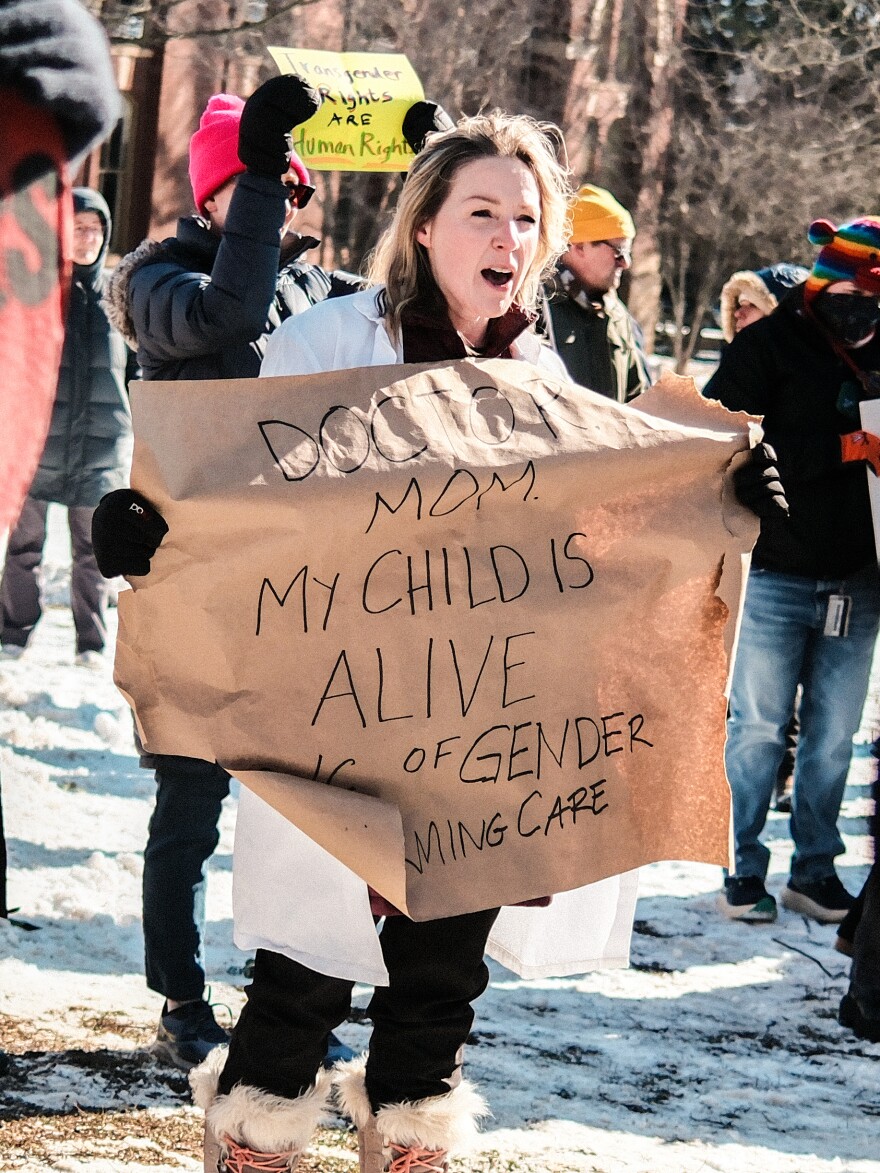UVA’s board of visitors could hear protesters chanting outside as they went into a closed session to discuss their dilemma. Late last month President Trump had threatened to withhold federal funds – including research grants and payments through Medicaid and Medicare – if they did not stop treating transgender patients under the age of 19.
While the matter is making its way through the courts, the board voted to continue therapy for current patients, but to refuse hormone treatment or puberty blockers for new patients. It has never done transgender surgery. Instead, the medical center will refer those who want a prescription or surgery to private providers.
The news upset Drs. Mo Nadkarni, Margaret Plews-Ogan, Leslie Olsakovsky, Ann Kellams and nursing student James Pegam.
“We start with the transgender population, but then the next population could be women trying to access birth control.”
“There is a sacredness to the doctor/patient relationship, and when politics invades that, we need to stand up and say something.”
“This is a very fragile part of our population that struggles with bureaucracy and all the roadblocks in society, and struggling to get medical care is a horrible thing to consider.”
“It is a population that is at high risk for mood disorders, suicide and what we do know and what evidence shows is that gender affirming care saves lives.”
“This is a slippery slope when we start legislation or regulating what happens between a patient and their doctor.”
Jill Kertulla agrees. The mother of a transgender child, she says hormone therapy made an incredible difference for her daughter.
“She’s in her early 30’s and is happier than she has ever been in life and in a good relationship and a good job, and I just am scared stiff that’s all going to get taken away.”
And she fears the president is putting transgender people in greater danger.
“The thing that is almost more than the medical thing is the permission that Trump has given for people be bigots and to create unsafe spaces for not only transgender but all kinds of other minorities.”
Word of the vote was not widely publicized. Many medical professionals said they didn’t know about it until Thursday evening, but a hundred people turned out to express concerns and were hoping to observe debate. Instead, only five people were allowed into the board room – and they were quickly ushered out when members went into executive session.
There was no discussion when the board returned for a vote. Only one– former Congressman Lewis Payne – voted against the ban, and he was advised by Rector Robert Hardie not to discuss his views with reporters. UVA President James Ryan was also silent on the subject.
Before the vote, one retired healthcare professional spoke out about the controversy.
When a baby is born, the medical team assesses its health and announces the child’s gender. This man, a medical specialist who asked that we not use his name, says he’s been on the team many times.
“I’ve been to thousands of deliveries – yes,” he told Radio IQ.
But rarely – once for every 45-hundred births – the gender isn’t clear.
"Sometimes you look and you're just not sure, because it’s kind of ambiguous."
The unusual development could be caused by a genetic condition, shortage of a certain enzyme or exposure to certain hormones before birth. The child’s sex organs may not match its genetics – the XX or XY pattern that identifies females and males, or they might not match internal organs like ovaries, a uterus or prostate gland. Whatever the situation, our source says it puts parents in a bind.
“They have to make a decision how they’re going to raise this child.”
And later in life, the child may also face medical and social problems.
“I have nothing but compassion for these folks, navigating a life where, from the beginning they’ve got medical issues, and then as they try to figure out who they are and how they want to present themselves, they’re getting pushback or challenge, when they’re just trying to be their best healthy self.”
Which is why he’s convinced these decisions should be made by families and their medical providers rather than politicians and government officials.


